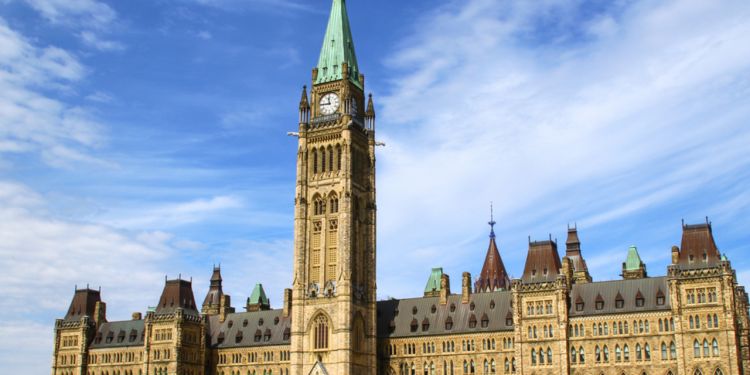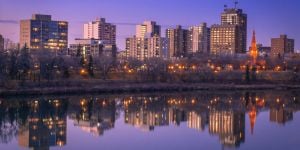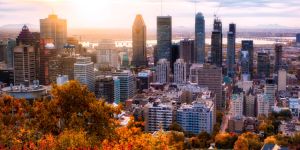
Ottawa isn't among Canada's biggest cities like its neighbors Toronto and Vancouver. However, it has been recognized as the 46th best student city globally by QS Top Universities. Located on the border of Ontario and Quebec, Ottawa is a diverse and lively bilingual city.
With a population exceeding one million, Ottawa is large enough to feature significant cultural attractions, yet it maintains a sense of safety and security due to its smaller scale. The charming Rideau Canal, situated at the city's core, provides an ideal setting for strolls in the summer or ice skating in the winter. Serving as Canada's administrative hub and housing the Parliament, Ottawa is also proud to host two prestigious universities.
Higher education in Canada
In Canada, each province oversees higher education, and there can be slight variations from one region to another. The country hosts universities providing degrees at the undergraduate (bachelor's), graduate (master's), and postgraduate (doctorate) levels, along with faculties offering technical training. Typically, undergraduate programs last 3 to 4 years, while graduate and professional programs last 1 to 3 years. The majority of Canadian universities are publicly funded, allowing you to obtain a globally recognized degree at a reasonable cost.
The academic year in Canada is divided into three semesters: fall (September–December), winter (January–April), and summer (May–August). As a general rule, programs start in September, although it is possible to change programs during the year.
Many international students discover that the higher education experience in Canada differs from what they're accustomed to in their home countries. Teacher–student exchanges occur in a familiar yet mutually respectful manner. During the early years, interaction might be minimal, especially in lecture theaters. To compensate for this, instructors designate specific times each week for availability, either online or in person. As time progresses, a mentorship spirit tends to develop between students and lecturers.
Canadians are known for their friendliness and benevolence, and this is reflected in the interactive, friendly, and open-minded atmosphere of classrooms. However, there is a distinct professional boundary between teachers and students.
Food and drink are often allowed in classrooms, which sometimes leads to late arrivals or early departures!
Language of instruction in Ottawa
Ottawa, being a bilingual city, fluently embraces both of Canada's official languages, English and French, although English dominates. Consequently, universities in Ottawa provide numerous programs in both languages. If English or French is not your first language, you typically need to demonstrate your proficiency through an exam as part of the application process.
Ottawa's major universities
University of Ottawa
The University of Ottawa, boasting over 42,000 students, holds the title of Canada's largest bilingual university. Notably, the renowned TV host Alex Trebek was an alumnus, honored with a room named after him on campus. Situated in the heart of the capital, the university's unique bilingual structure stands out as one of its defining features. With a diverse array of more than 550 programs, including 350 graduate programs offered in both English and French for undergraduates, the university provides flexibility. All courses are accessible in both languages, enabling students to tailor their curriculum to their language preferences.
Known for its distinctive bilingual setup, comprehensive educational offerings, and commitment to research and academic excellence, the University of Ottawa is forward-looking in shaping its future. Standout programs at the university include "Digital Humanities", "Biomedical Sciences", and "French Immersion", where students immerse themselves in the French language during a portion of their degree for mastery. The Faculty of Law is conveniently located just a stone's throw away from both the Supreme Court of Canada and the Federal Court of Canada.
A quarter of the University of Ottawa's student body hails from abroad, with representation from over 150 countries. According to the QS World University Rankings, the university holds the 203rd spot globally.
For first-year students, on-campus housing is guaranteed, while a limited number of on-campus housing options are available for graduate students.
Find out more about the University of Ottawa here.
Carleton University
Founded in 1942, Carleton University is the newest addition to Ottawa's universities. Initially created to cater to the needs of World War II veterans, Carleton has evolved into one of Canada's top comprehensive universities. Leveraging its strategic location in the heart of Canada's capital, the university provides students with valuable opportunities. Following their professional internships, students benefit from the experience in the city's technology firms or government offices.
Carleton University benefits from a smaller enrollment of 26,900 students, focusing on practical work and the formation of close-knit groups. Notable programs at the university include "Public Affairs & Policy Management", "Sustainable & Renewable Engineering", and "Health Sciences".
Situated 15 minutes from downtown between the Rideau Canal and the Rideau River, the Carleton campus offers a convenient location. What students cherish and often recall about Carleton University is the welcoming, supportive atmosphere. Faculty and staff are easily approachable and dedicated to ensuring student success.
Find out more about Carleton University here.
Admission requirements for Ottawa universities
Admission requirements for international students can vary based on the university and the student's country of origin. If neither English nor French is your first language, you'll need to prove your proficiency in one or both of these languages through a language test.
For those who are neither residents nor Canadian citizens but intend to study in Canada for more than 6 months, obtaining a study permit is necessary. The process begins upon receiving an acceptance letter from the university. It's recommended to initiate the application promptly, as the process can be time-consuming. Online application submission is now available through the Canadian immigration website. To apply, you'll need to provide the university acceptance letter, proof of identity, evidence of financial resources, and, if applicable, a medical certificate. This guide from QS Top Universities offers information on obtaining a study permit in Canada.
Tuition fees at Ottawa universities
While tuition costs in Canada are generally lower than those in the US or the UK, it is still considered a relatively expensive destination for higher education compared to many other countries. According to the EduCanada website, undergraduate tuition fees for international students are equivalent to $36,100 CAD for an 8-month academic year. In Ottawa, specific undergraduate tuition fees vary depending on the chosen university and program. You can consult the tuition fees for Ottawa here.
Good to know:
At the University of Ottawa, international students studying in a French-language program benefit from a partial tuition waiver.
To finance your studies, you have the option of working 20 hours a week on or off campus, 40 hours a week during vacations, or completing a paid internship.
International students at Ottawa universities have access to scholarships, grants, and merit-based bursaries. These financial aids may be granted based on excellent academic performance, notable sporting achievements, or financial difficulties. QS Top Universities has created a guide on financial support for international students. Both the University of Ottawa and Carleton University offer various types of scholarships. In Canada, known for its maple syrup, there's a robust strategy in place to retain qualified students within the university system. As part of this approach, the government and universities provide substantial financial support to students who achieve outstanding academic results.
Cost of living in Ottawa
When compared to its larger counterparts like Toronto and Vancouver, the cost of living in Ottawa is relatively lower, making it a significant advantage for those considering studying in the capital. However, individual needs and preferences play a role in determining the actual cost of living. There are several ways to save money, such as sharing an off-campus apartment, cutting back on outings, opting for home-cooked meals instead of dining out, and using public transportation. In Ottawa, you can expect to spend around CA$1,500 per month on living expenses, excluding tuition and rent. For a more detailed understanding of the overall cost of living in the capital, you can visit Numbeo.
Student housing in Ottawa
Students in Ottawa have the option to live either on or off campus, each type of accommodation carrying its own set of advantages and disadvantages. The important factor is selecting the one that aligns with your expectations and, most importantly, your budget. Living on campus offers full integration into the university community, but it tends to come with a higher cost. Typically, students opt for on-campus living in their first year and then transition to off-campus housing. Both the University of Ottawa and Carleton University ensure a room in residence for first-year students.
Due to limited space, it's advisable to apply for residence as early as possible. Housing options include shared or individual apartments. For first-year students at Carleton University, accommodation typically consists of double dormitories.
Accommodation costs include rent for an eight-month period, running from September to April. As per the Carleton University website, off-campus housing prices vary from C$9,600 to C$15,400. On-campus housing is priced at C$12,385.
If you're considering living off-campus, the housing services at these two universities can provide valuable information about available support measures, the application process, tenant rights, and listings for shared accommodations. Logically, the closer you reside to your respective campuses, particularly in downtown Ottawa, the higher your rent is likely to be. Rental rates start at $625 CAD/month for a room in a shared house. For a one-bedroom apartment in the downtown core, you can expect to pay around $1861 CAD. If you choose to live across the border in Gatineau, for instance, the rent will be CA$100 less. Gatineau is strategically located just 8 km from the University of Ottawa campus and is easily accessible by public transit.
Getting around Ottawa
University of Ottawa and Carleton University students enjoy a transportation card known as the U-Pass, and its cost is already covered in their tuition fees. This subsidized card is accessible to all full-time students in the Ottawa and Gatineau region and is priced at $223.48 CDN per session.
Jobs and internships in Ottawa
As an international student with full-time status, you're typically allowed to work on or off campus, given you have a valid study permit. To do so, you'll need a Social Insurance Number (SIN), which can be obtained from Service Canada. During school terms, off-campus work is restricted to 20 hours per week, but you have the flexibility to work full-time during vacation periods.
It's quite common for both international and Canadian students to take training courses or internships as part of their study programs, providing an excellent blend of theoretical knowledge and practical experience. This serves as a perfect chance for them to acquire their initial professional exposure in Canada and establish themselves in their chosen field. Both Carleton University and the University of Ottawa provide programs that enable students to earn a degree while gaining over a year's worth of work experience in Canada. To pursue this, one needs to apply for a work permit through the immigration authorities.
Student life in Ottawa
While serving as Canada's federal government hub, Ottawa extends well beyond its administrative role. The city boasts a diverse array of evening entertainment and cultural activities. Located near major metropolises like Toronto and Montreal, Ottawa stands out as a welcoming capital. Exploring Ottawa provides a chance to discover Canada's rich Anglophone and Francophone heritage. Moreover, it's an exceptionally enjoyable city that you'll never grow tired of exploring.
Adjusting to Canada's capital city climate may take some time. While known for its long winters and heavy snowfall, you'll come to appreciate the distinct charm of each of the four seasons. In autumn, the trees adorn vibrant colors, creating a magical atmosphere during walks. Unique holidays like Thanksgiving and Halloween add to the seasonal experience. Winter transforms Ottawa into a snowy wonderland, aglow with Christmas decorations. The Rideau Canal becomes a massive skating rink, bringing joy to both the young and the old. For those seeking warmth, numerous Tim Hortons cafés provide a cozy refuge. Spring marks the season of maple syrup and the rejuvenation of nature after the prolonged winter. Summer in Ottawa invites picnics, strolls by the lakes, and the chance to embrace Canada's splendid natural surroundings.
Canadian universities prioritize the personal development of their students, going beyond just academic achievements. Engaging in campus life allows you to connect with individuals who can assist in your smooth transition to the new city and campus. Additionally, both universities in Ottawa host a diverse array of sports, cultural events, and various activities for students to participate in. You won't even have a chance to get bored!
Canadians have a reputation for being one of the friendliest people globally, and residents of Ottawa, in particular, take great pride in their country. There exists a robust connection among universities, government, businesses, and political organizations, providing international students with a unique and valuable opportunity.
Things to see and do in Ottawa
As the capital, exploring the Canadian Parliament and national museums are top activities for visitors to Ottawa. The Byward Market, among Canada's oldest markets, is an excellent spot to grab fresh produce and gourmet delights. For a taste of nature with lakes, hills, and trees, Gatineau Park is a must-visit! In winter, don't miss the chance to skate on the ice along the Rideau Canal. With the arrival of spring, indulge in maple syrup and Canadian-style pancakes. The Canadian way of life awaits you!
As a cultural melting pot, Ottawa offers a diverse mix of culinary specialties. However, that doesn't mean you shouldn't try Canadian classics like poutine and beaver tails. If you find yourself in Canada during the summer, make sure not to miss Canada Day (July 1) in Ottawa. Dress yourself out in the colors of the national flag, grab your maple leaves, and join the spectacular celebration on Parliament Hill. Ottawa hosts numerous festivals throughout the year, providing entertainment for all.
For your evenings out, the bars in Byward Market are the perfect spots to meet new people. If you're a beer lover, be sure not to miss The Bier Market, boasting a menu with over a hundred beers from around thirty countries.
Useful links:
We do our best to provide accurate and up to date information. However, if you have noticed any inaccuracies in this article, please let us know in the comments section below.








